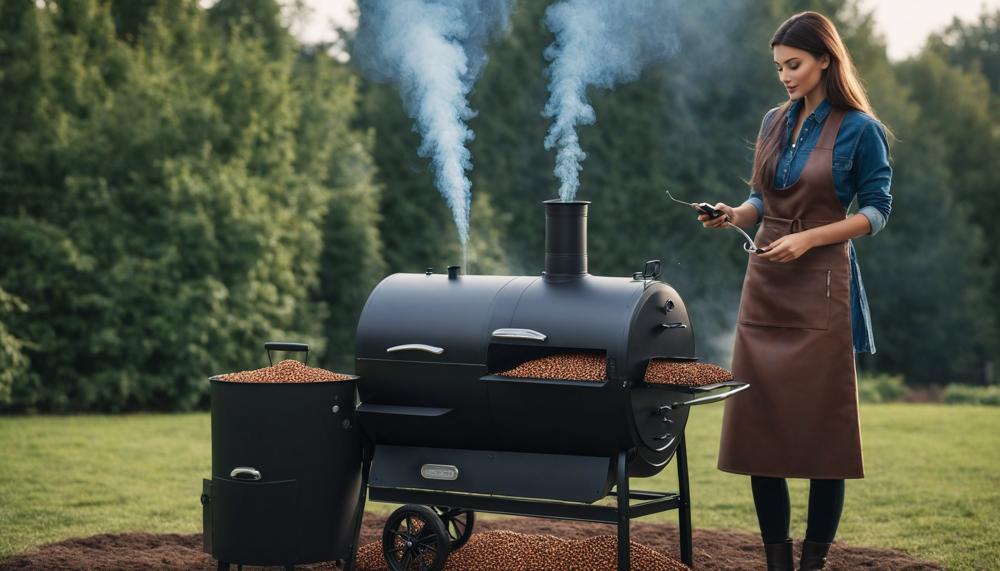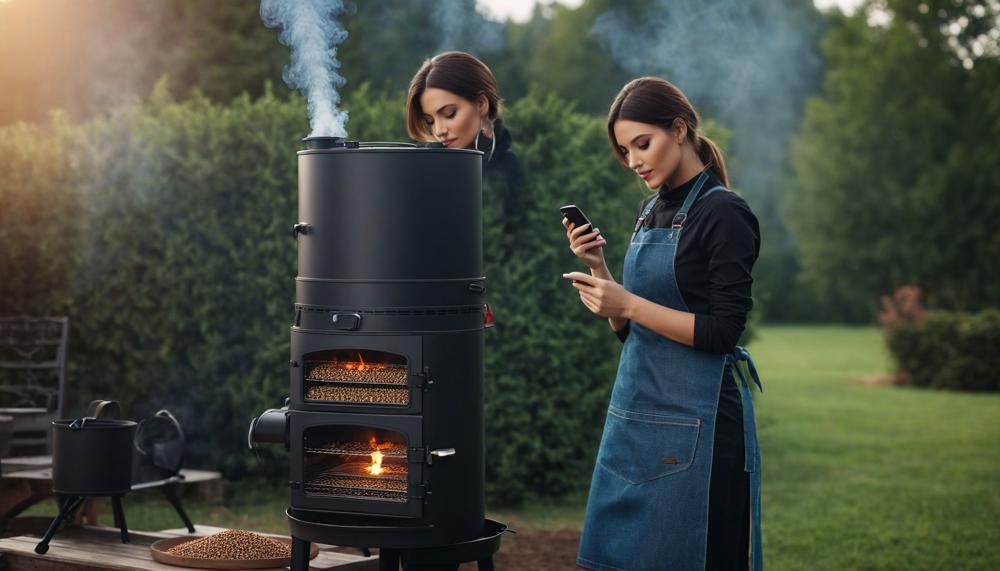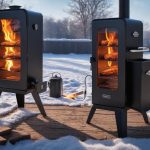No, you should not use a pellet smoker in the garage. The risks far outweigh any potential convenience. Using a pellet smoker in an enclosed or poorly ventilated space poses serious dangers, including fire hazards and carbon monoxide poisoning. Ensuring proper ventilation and taking necessary precautions is crucial, and a garage often doesn’t meet these safety requirements.
Using a pellet smoker in a garage can be tempting due to the protection it offers from the elements, but this practice comes with significant safety concerns. Here’s why:
- Fire Hazards: Pellet smokers generate heat and flames, which can ignite flammable materials commonly found in garages.
- Carbon Monoxide Risks: Pellet smokers emit carbon monoxide, a deadly gas that can build up in enclosed spaces, leading to poisoning.
- Poor Ventilation: Garages typically lack adequate ventilation, increasing the risks associated with smoke and gas accumulation.
For a safer alternative, consider using your pellet smoker in an open, well-ventilated area such as a porch or deck. If weather protection is needed, a covered outdoor space or a dedicated smoking area in your yard is a much safer choice. Taking these steps will help ensure you enjoy your smoking experience without compromising safety.
Contents
The Risks of Using Pellet Smoker in the Garage
The short answer is, using a pellet smoker in a garage is hazardous and not recommended. Here are the key potential risks:
- Carbon Monoxide Poisoning: Pellet smokers emit carbon monoxide (CO), a colourless and odourless gas that can be deadly. In an enclosed space like a garage, CO can quickly accumulate to dangerous levels, posing serious health risks or even death.
- Fire Hazards: Garages are typically cluttered with flammable items. Without proper ventilation, heat from the smoker can ignite nearby objects, leading to a fire. Also, a blocked chimney can cause smoke and heat to back up into the garage, increasing the fire risk.
- Explosion Risk: If the chimney is not properly opened or maintained, pressure can build up inside the smoker, potentially causing an explosion.
- Smoke and Fumes: The smoke and fumes from the pellet smoker can damage items stored in the garage and affect the air quality. Prolonged exposure to smoke can lead to respiratory issues and other health problems for anyone nearby.
- Property Damage: The smoke and residue from the smoker can coat surfaces in the garage, leading to long-term damage and requiring costly cleaning or repairs.
Can I Use My Pellet Smoker In The Garage?
No, it is not safe to use a pellet smoker in an enclosed space like a garage.
The primary reason is the risk of carbon monoxide poisoning. Pellet smokers produce smoke and carbon monoxide, a colorless, odorless gas that can be deadly in high concentrations. Without proper ventilation, these gases can accumulate to dangerous levels, posing a severe health risk.
Additionally, using a pellet smoker in an enclosed space increases the risk of fire. Garages often contain flammable materials, and the high temperatures and open flame of a smoker can ignite these items, leading to a potentially catastrophic fire.
| Risk | Description | Consequence |
| Carbon Monoxide Poisoning | Accumulation of dangerous gases due to lack of ventilation. | Serious health risks, including death. |
| Fire Hazard | High temperatures and open flames in an area with flammable materials. | Increased risk of garage fires. |
| Smoke and Fumes | Lingering smoke can damage items and cause breathing issues. | Property damage and respiratory problems. |
| Explosion Risk | Combustible materials in the garage could ignite. | Potential for explosions causing severe damage. |
Barbecue Tips and Guides – Kept Simple
Using a pellet smoker in a garage requires careful consideration to ensure safety and achieve the best grilling results. Here are the key factors to keep in mind:
Ventilation
Ensure the garage is well-ventilated. Open windows and doors to allow proper airflow. Installing a ventilation fan can also help to disperse smoke and carbon monoxide.
Placement
Position the smoker away from flammable materials and ensure it is not too close to walls or other objects. Ideally, place the smoker near the garage opening or door.
Fire Safety

Keep a fire extinguisher nearby and ensure it’s rated for grease fires. Remove any clutter or flammable items from the area around the smoker.
Smoke Management
Use a smoking tube and a grill light to monitor smoke levels and visibility. Too much smoke can indicate poor ventilation and pose a health hazard.
Temperature Control
Utilize a reliable meat thermometer to maintain proper cooking temperatures. Preheat the grill properly to ensure consistent cooking.
Carbon Monoxide Detection
Install a carbon monoxide detector in the garage to monitor for dangerous gas levels. Ensure it’s in working condition and regularly tested.
Alternative Locations
If possible, consider using the smoker on an open porch or deck instead of inside the garage. This can significantly reduce risks associated with indoor grilling.
Conclusion
Using a pellet smoker in your garage might seem like a convenient solution, but it’s fraught with significant risks. The primary concerns revolve around safety hazards such as carbon monoxide poisoning, fire risks, and poor ventilation.
Pellet smokers emit carbon monoxide, a dangerous gas that can accumulate in enclosed spaces like garages, leading to serious health risks or even fatal consequences. Additionally, the heat and flames from the smoker can ignite flammable materials often found in garages, posing a severe fire hazard.
Poor ventilation exacerbates these issues, allowing smoke and harmful fumes to build up, which can damage property and cause respiratory problems. Moreover, a blocked chimney can result in pressure build-up, potentially leading to an explosion.
To avoid these dangers, use your pellet smoker in an open, well-ventilated area such as a porch or deck. If you need protection from the elements, consider a covered outdoor space. These precautions will help you enjoy your smoking experience safely and without compromising your health or property.






